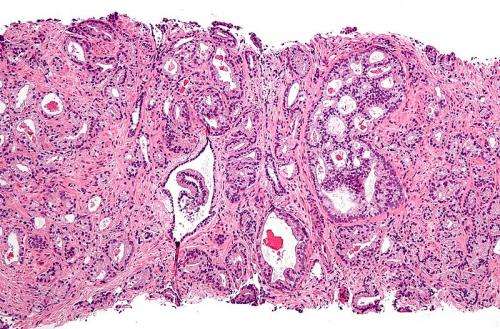New genetic compound marker could help early diagnosis of aggressive prostate cancer

A research team at the University of Turku in Finland discovered a link between the interplay of certain simultaneously occurring genetic changes in the HOXB13 and CIP2A genes, aggressiveness of prostate cancer, high risk of developing the disease, and poorer survival rates of patients. Prostate cancer is a major challenge in health care, causing over 1 million new cases and 300,000 deaths each year worldwide.
One of the involved genes, HOXB13, was already known to play a role in prostate cancer risk, although its mechanism is not yet understood. The other gene, CIP2A, codes for an oncoprotein, thought to play a role in human tumour formation.
"The research shows that synergism between the HOXB13 and CIP2A genes predispose men to get prostate cancer earlier in life. The synergism is also linked to the high level of prostate specific antigen (PSA), and earlier biochemical recurrence. Further, the simultaneous expression of these two gene variants stimulates prostate cancer cell growth, migration and, therefore, tumour formation," explains Professor Johanna Schleutker, leader of the research group at the Institute of Biomedicine.
One of the most notable current unmet needs in prostate cancer care is being able to diagnose aggressive cancers at an early stage. Genetic testing for HOXB13-CIP2A could help identify these patients sooner and may bring new opportunities for the early detection and precision oncology in prostate cancer.
"The small changes in both of the genes make it possible for CIP2A to boost the effect of the HOXB13 gene, which results in the highest-ever observed prostate cancer risk. Men who have these two variants simultaneously are 21 times more likely to get prostate cancer and 2.3 times more likely to get the aggressive form of it," says Docent Csilla Sipeky from the University of Turku, the first author of the paper.
Although the study involved a large population of over 7,000 patients and an equal number of controls, it is limited by the fact that they are primarily Caucasian populations from northern Europe. Further research involving other demographics is needed to validate the findings.
More information: Csilla Sipeky et al, Synergistic interaction ofHOXB13andCIP2Apredispose to aggressive prostate cancer, Clinical Cancer Research (2018). DOI: 10.1158/1078-0432.CCR-18-0444
















